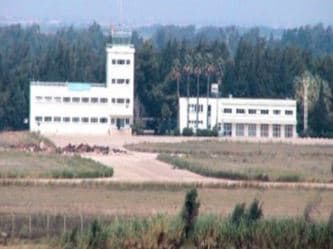by MEMRI
Hizbullah's ongoing control of security at Beirut–Rafic Hariri International Airport has again been in the headlines, following the August 9, 2013 kidnapping of two Turkish Airlines pilots near the airport. Several foreign airlines have since changed their landing schedules out of fear that the same might happen to their employees. [1]
The Turkish pilots' abduction was apparently in retaliation for the May 2012 kidnapping of 11 Lebanese Shi'ites by an armed Syrian opposition group in northern Syria.[2] Negotiations to free these 11 hostages were conducted between Lebanon and the Syrian kidnappers via various intermediaries; they were released on October 19, 2013 and returned to Lebanon in the framework of a wider deal brokered by the Turks and Qataris that also included the release of the two Turkish pilots.[3]
The abduction of the pilots very shortly after they left the airport grounds, and the location of the abduction, near the Dahiya suburb south of Beirut, a Hizbullah stronghold, prompted speculation in Lebanon that the organization had played a role in it. Numerous March 14 Forces supporters contended, following the abduction, that Hizbullah had infiltrated the airport's security apparatus.[4]
The March 14 Forces have been critical of Hizbullah's control of various aspects of the airports' operation for years, beginning in May 2008, when they claimed that the organization had set up its own security cameras there to monitor passenger movements.[5] At the time, Druze leader MP and former March 14 Forces member Walid Jumblatt claimed that Hizbullah was receiving weapons shipments via the airport, and was plotting to kill Lebanese citizens there. Because of these contentions, the government of Lebanese prime minister Fouad Siniora, a senior member of the Al-Mustaqbal stream and the March 14 Forces, dismissed airport security chief and Hizbullah associate Gen. Wafiq Shukair. The March 14 Forces' criticism and the dismissal of Shukair, paired with additional government measures against Hizbullah's private communications network, led to a Hizbullah backlash and its takeover of western Beirut and other areas in Lebanon, [6] fueling fears of civil war.
Then, as now, the claim that Hizbullah had infiltrated the airport's security apparatus prompted harsh reactions by March 14 Forces activists and politicians and by the newspapers identified with them; among these reactions were various proposals and initiatives for resolving the problem.
This paper will review the March 14 Forces' claims regarding a Hizbullah takeover of security at Beirut–Rafic Hariri International Airport as well as the March 14 Forces' failed attempt to use another airport as an alternative to the Beirut airport.
March 14 Forces: The Airport Is Hizbullah's Hostage
Rafic Al-Hariri Airport Has Become Iranian Supreme Leader Khamenei Airport
Various elements belonging to the March 14 Forces
and their supporters have argued since the pilots' kidnapping that
Hizbullah and Iran are controlling security at the airport. An October
11 editorial in the daily Al-Mustaqbal, which is identified with
the March 14 Forces, noted that the kidnapping "again focuses the
spotlight on the fact that Lebanon is a hostage and its airport is a
hostage [to Hizbullah and Iran]. And just in case we forgot this for a
spell, the axis of evil [i.e. Hizbullah, Syria and Iran] reminds us of
it." [7]
'Ali Hamada, a columnist for the Lebanese daily Al-Nahar
which is likewise identified with the March 14 Forces, wrote the same
day that "the kidnapping serves as a reminder that Beirut airport is
also [i.e. in addition to the airport-Beirut highway] under Hizbullah
occupation, and anyone who [passes] through it submits himself for a few
hours to the mercies of an organization that most Arab countries,
Europe, and the U.S. have defined as a terrorist organization... The
Rafic Al-Hariri International Airport has in effect become [Iranian
Supreme Leader] Khamenei International Airport. This is the truth."[8]
Fatma Hoho, an Al-Mustaqbal columnist,
wrote, "Iranian intelligence is overseeing traffic at the airport with
the [help of] Hizbullah activists... who have [now] completed their
takeover of it [that began] following the incidents of May 7, 2008."[9]
Hizbullah Knows About Everyone Who Enters The Country
Al-Mustaqbal MP and chairman of the parliamentary
Public Works, Transport, Energy and Water Committee Muhammad Qabbani
explained: "Hizbullah's influence is not limited to the security
apparatuses [operating] within the Beirut airport. The organization's
eyes and arms [may] appear simple but are [highly] effective – [they
include] hundreds of porters who are politically loyal to the
organization as well as taxi drivers at the airport entrances."[10]The writer 'Ali Al-Husseini argued in an October 24, 2013 article in Al-Mustaqbal
that Hizbullah controls all the country's air, land, and sea border
crossings, and has information on everyone who enters the country:
"Hizbullah welcomes you on the airport's tarmac, but this [welcome]
begins not when you set foot on the ground but when you are still on
board the plane. Usually, Hizbullah gets visitors' names and details
even before they board the plane, and the same is true regarding [the
border crossings] by sea and by land. Its informants are everywhere,
making it easy for their leadership to know about anyone entering the
country, and particularly if there are any question marks or suspicions
about him."[11]
Weapons From Iran Are Funneled Through Airport To Hizbullah
The Saudi Alarabiya.net reported, citing
anti-Hizbullah Lebanese sources, that Hizbullah has infiltrated the
airport security apparatus and that it maintains contacts with it on an
informational exchange basis. According to the report, Hizbullah
receives vital information from the airport security apparatus and in
return provides information of its own to the state security apparatus.
The sources added that "weapons from Iran and other places pass through
the airport to Hizbullah."[12]
Hizbullah's Control Over Airport Security Facilitated Political Assassinations
Lebanese activist Qarim Al-Rifa'i, who headed a campaign to secure Beirut airport and to begin using another
airport as an alternative, argued that Hizbullah's control of airport
security had led to the assassination of Lebanese leaders who were
outspoken critics of the Hizbullah-Syria-Iran resistance axis. Al-Rifa'i
said: "Everybody knows that the assassination of the martyrs Gebran
Tueni,[13]Antoine Ghanem,[14] and Gen. Wissam Al-Hassan[15] came after their entry into Beirut airport was monitored."[16]
It should be noted that as early as May 2008, MP Walid Jumblatt had
warned that Hizbullah controlled the airport, was operating surveillance
cameras there, and was planning to assassinate Lebanese political
leaders.[17]
Hizbullah Sabotages Campaign To Begin Using Alternate Airport
Along with leveling these accusations against
Hizbullah, senior Lebanese politicians and officials urged the state to
ensure the security of Lebanese citizens passing through Beirut airport,
and to begin using another airport as an alternative. Al-Mustaqbal MP
Muhammad Kabbara said, appealing to Lebanese President Michel Suleiman:
"If you cannot protect the Lebanese people from the malevolence of a
terrorist party [namely, Hizbullah], then at least provide them, and
visitors to Lebanon, with a secure airport that is not Rafic Al-Hariri
Airport."[18]
A few days after the Turkish pilots' abduction in
August, Lebanese activists launched a social media campaign called
"Secure Beirut Airport and Begin Using Al-Klayaat Airport."[19]

"The People Want Al-Klayaat Airport Opened" (source: Facebook.com/AirportKlayaat, August 14, 2013)
The campaign called upon citizens to be passengers
on an August 16 showcase flight by several airlines from Beirut to
Al-Klayaat; however, after it was postponed to August 21, the event
never got off the ground because of pressure from Hizbullah. Campaign
initiator Qarim Rifa'i told a press conference that due to this
pressure, all the airlines that had agreed to participate in the event
had backed out.[20]
One post on the campaign's Facebook page stated:
"How long will we continue to fly via Rafic Al-Hariri Airport, which has
become a den of terror and kidnapping... How long will Lebanon remain a
hostage of... Hizbullah?"
<![]-->
Facebook.com/klayaatairport, October 5, 2013.

Facebook.com/klayaatairport, October 5, 2013.
While Hizbullah itself has not officially responded
to the accusations regarding its control of Beirut airport security,
the daily Al-Akhbar, which is close to Hizbullah, argued that the
demand to begin using an alternative airport stemmed from sectarian
Sunni interests. Al-Akhbar columnist Muhammad Nazzal wrote: "The
talk about this airport [Al-Klayaat] in the Akkar region in the north is
nothing new. But recently [this talk] has increased for 'sectarian'
reasons, [and is calling for] the establishment of additional airports
far from 'Hizbullah control' – that is, 'Shi'ite' [control]...
Therefore, what they are demanding today is the opening of the 'Sunni'
Al-Klayaat Airport to counter the 'Shi'ite' Beirut airport."[21]

Al-Klayaat Airport (Al-Mustaqbal, Lebanon, August 18, 2013)
Endnotes:
[1]Al-Mustaqbal; Al-Akhbar (Lebanon), August 30, 2013.
[2]
The 11 Lebanese Shi'ites were kidnapped on the pretext that they were
senior Hizbullah officials who had come to spy on these armed Syrian
opposition groups. Their kidnapping, which came just after they had
crossed the Turkey-Syria border while en route from Iran to Lebanon,
prompted their relatives to accuse the Turkish intelligence apparatuses
of involvement in the kidnapping and to claim that the kidnappers were
backed by these apparatuses. Over the months, relatives of the kidnapped
Lebanese Shi'ites had threatened to harm Turkish interests in Lebanon,
as indeed happened when the Turkish pilots were abducted.
[3] The deal also included the release of several female Syrian prisoners from prisons of Syrian President Bashar Al-Assad.
[4]
Western intelligence sources claim that Lebanese businessmen in western
Africa are smuggling funds to Hizbullah via passengers flying to
Beirut, and that this is made possible by Hizbullah's control of the
airport's security apparatus. Al-Mustaqbal (Lebanon), September 21, 2013.
[5] See MEMRI Inquiry and Analysis No. 436, A Clean Sweep: Amal, Hizbullah Take Much of Beirut in Redux of Hamas' Gaza Takeover, May 9, 2008.
[6]
In these Hizbullah-initiated riots, which took place on May 7, 2008 in
Beirut, in Mount Lebanon and in the north of the country, Hizbullah
forces took control of extensive parts of these regions, closed Rafic
Al-Hariri airport and the Beirut seaport, burned down the studios
of media companies associated with the parties comprising the
government, and surrounded public buildings and the private residences
of anti-Syria Lebanese figures. At least 81 were killed and 250 wounded
in the unrest. See MEMRI Inquiry & Analysis No. 436, "A Clean Sweep: Amal, Hizbullah Take Much of Beirut in Redux of Hamas' Gaza Takeover, May 9,2008.
[7] Al-Mustaqbal (Lebanon), August 11, 2013.
[8] Al-Nahar (Lebanon),
August 11, 2013. Al-Mustaqbal MP Ahmad Fatfat said: "Hizbullah holds
hostage the Beirut airport and the road to it… and uses this hold to
extort the world and Lebanon as it wills." Al-Mustaqbal (Lebanon), August 13, 2013.
[9] Al-Mustaqbal (Lebanon), August 13, 2013.
[10] Alarabiya.net, August 12, 2013.
[11]Al-Mustaqbal (Lebanon), October 24, 2013.
[12] Alarabiya.net, August 12, 2013.
[13] Tueni was a former member of the Lebanese parliament and the grandson of the founder of the Lebanese daily Al-Nahar;
he was a frequent critic of Syria and its involvement in Lebanon. He
was killed December 12, 2005, when his car was blown up, just after his
return from Paris, where he had lived for his own safety.
[14]
Ghanem, an anti-Syria member of the Lebanese parliament, a member of
the Phalange party and a presidential candidate, was assassinated on
September 19, 2007, in a car bomb attack. He too had just returned to
Lebanon after living abroad for his own safety.
[15]
Al-Hassan headed the information branch of Lebanese internal security
and had uncovered a Syrian intelligence plot to set off bombs in various
regions of Lebanon. He was assassinated October 19, 2012, also with a
bomb; he too had just returned to Lebanon, from Germany.
[16] Al-Mustaqbal (Lebanon), August 15, 2013.
[17] Al-Sharq Al-Awsat (London), June 4, 2008; Al-Akhbar (Lebanon), May 3, 2008.
[18] Al-Mustaqbal (Lebanon), August 11, 2013.
[19] Al-Mustaqbal (Lebanon), August 13, 2013.
[20] Al-Mustaqbal (Lebanon), August 22, 2013.
[21] Al-Akhbar (Lebanon), August 14, 2013.
MEMRI
Source: http://www.memri.org/report/en/0/0/0/0/0/0/7579.htm
Copyright - Original materials copyright (c) by the authors.
No comments:
Post a Comment